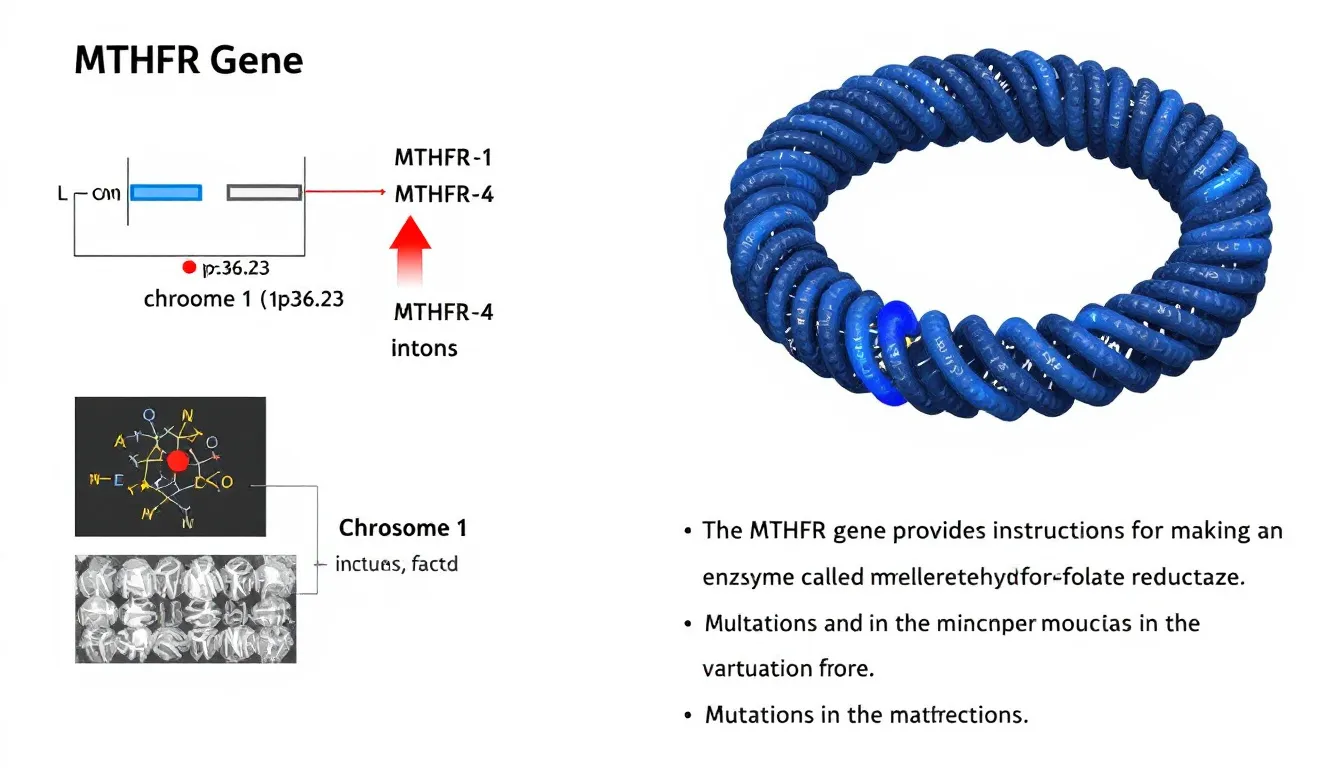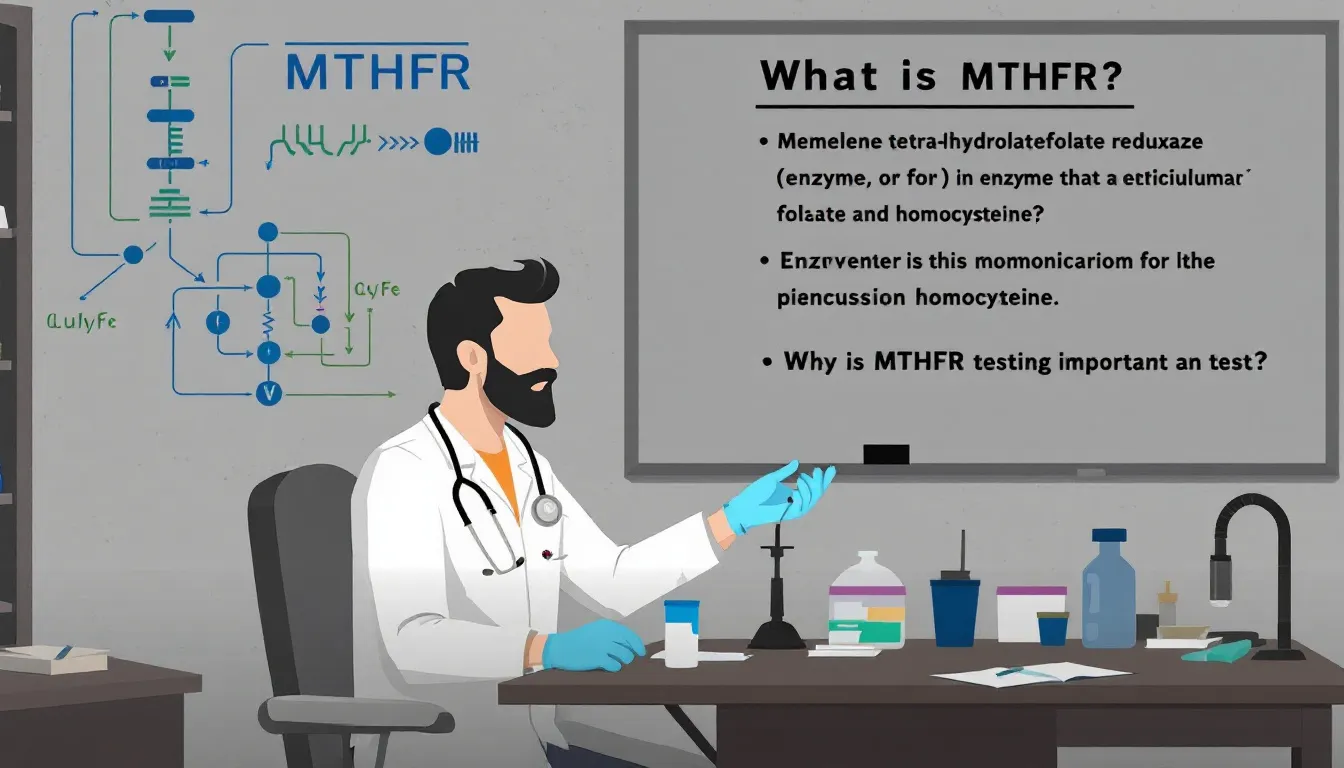Testing for the MTHFR gene can reveal mutations that impact your body’s folate metabolism and homocysteine regulation. This test, specifically testing for MTHFR gene variations, is essential for understanding potential health risks, such as cardiovascular problems and pregnancy complications. Learn why MTHFR testing matters, how it works, and what the results could mean for you.
Key Takeaways
The MTHFR gene is crucial for processing homocysteine, impacting folate metabolism and overall health.
Testing for MTHFR gene variants can reveal health risks associated with elevated homocysteine levels, yet the clinical justification for widespread testing remains debated.
Interpreting MTHFR test results requires professional guidance, as both positive and negative results carry implications for health management.
Understanding the MTHFR Gene

The MTHFR gene, or methylenetetrahydrofolate reductase, is a critical player in our body’s metabolic processes. This gene provides instructions for producing the enzyme methylenetetrahydrofolate reductase, which processes the amino acid homocysteine. This enzyme converts homocysteine into another amino acid, helping regulate homocysteine levels in the blood and supporting overall health.
Folate metabolism heavily depends on the MTHFR gene, which is responsible for processing amino acids to ensure effective utilization of folate in the body. Proper folate metabolism influences DNA synthesis and repair, crucial for maintaining healthy cells and preventing various health issues.
Why Test for MTHFR Gene Variants?

Testing for MTHFR gene variants provides valuable insights into various health risks and conditions. Mutations in the MTHFR gene are linked to several health issues, including cardiovascular disease and neural tube defects. Elevated homocysteine levels, a common consequence of these mutations, can damage blood vessels and increase the risk of cardiovascular disease such as thrombosis and coronary artery disease. Additionally, understanding the mthfr gene variant can help in assessing these risks more accurately.
During pregnancy, high homocysteine levels slightly increase the likelihood of neural tube defects in the developing fetus and contribute to complications like pregnancy loss and birth defects. Despite these associations, the clinical justification for MTHFR testing remains a topic of debate. Some experts argue that the weak links between MTHFR variations and numerous health conditions do not warrant widespread testing.
However, knowing one’s MTHFR status can still raise awareness and enable proactive health measures. Understanding the potential risks enables individuals to make informed decisions about their diet, lifestyle, and healthcare, even if the direct clinical benefits of MTHFR testing are not entirely conclusive.
Types of MTHFR Gene Mutations
The MTHFR gene has several common mutations, with C677T and A1298C being the most prevalent. These mutations can influence how well the methylenetetrahydrofolate reductase enzyme functions. Inheriting two copies of these mutations (being homozygous) can lead to elevated homocysteine levels and health complications.
For instance, individuals with homozygous C677T mutations may be predisposed to homocystinuria, a condition affecting various body parts including the eyes and joints. Similarly, the A1298C mutation can contribute to high homocysteine levels, increasing the risk of related health issues, especially if the individual’s diet is low in folate.
How is the MTHFR Gene Test Conducted?

An MTHFR gene test can be conducted using either a blood sample or a buccal swab. A healthcare professional typically draws a small amount of blood from a vein for a blood test, a quick and simple procedure. Alternatively, a buccal swab can be performed at home using a test kit, making it a convenient option for many.
There are no special preparations required before undergoing an MTHFR gene test. After collection, the sample is sent to a laboratory for genetic analysis to determine the presence of MTHFR gene variations.
Interpreting MTHFR Gene Test Results
Interpreting MTHFR gene test results often requires guidance from a healthcare professional due to their complexity. The implications of the results vary based on the individual’s health history and other factors. While MTHFR gene test results generally do not drive major clinical decisions, they can offer valuable insights into potential health risks.
Understanding both positive and negative results is important. A positive result indicates the presence of MTHFR gene variants, while a negative result suggests typical MTHFR function. In either case, consulting with a healthcare provider helps contextualize the results and plan any necessary health measures.
Positive Result Implications
A positive MTHFR gene test result indicates the presence of one or more MTHFR gene variants. This may necessitate health interventions like supplementation with B vitamins (B6, B12, and folate) to support individuals with MTHFR mutations. Methylfolate is often recommended over standard folic acid due to its better absorption by those with MTHFR mutations.
For pregnant women, folic acid supplements are crucial to minimize the risk of neural tube defects, regardless of their MTHFR status. Dietary adjustments and supplements can significantly benefit those managing elevated homocysteine levels.
Negative Result Implications
A negative MTHFR gene test result indicates no detected mutations, suggesting typical MTHFR function. However, maintaining a healthy lifestyle and diet remains important, as other factors can influence overall health.
Consulting healthcare providers is advisable to fully interpret negative test results and discuss any additional health evaluations or measures if needed. Understanding the broader context of one’s health remains essential, even when genetic testing reveals no variations.
Preparing for Your MTHFR Gene Test

Preparing for an MTHFR gene test is straightforward, with no specific preparations required. However, individuals with a positive test result may need to consider dietary adjustments, such as increasing folate intake to mitigate potential health risks.
Discussing any changes in health habits with a healthcare provider before undergoing the test ensures that dietary or lifestyle adjustments are well-informed and beneficial.
Risks and Considerations

Although the MTHFR gene test is generally safe, minor risks such as slight discomfort or bruising at the blood draw site can occur. These effects are usually temporary and resolve quickly.
Ethical considerations also arise with genetic testing, especially when marketed directly to consumers. The clinical validity of some test results can be uncertain, raising concerns about unnecessary anxiety and the misinterpretation of data.
Alternatives to MTHFR Testing
For those wary of genetic testing, alternatives exist to monitor and manage homocysteine levels. Regularly monitoring homocysteine levels can provide insights into cardiovascular health and nutritional status.
Increasing the intake of leafy greens and legumes, along with taking vitamin B supplements, can help manage high homocysteine levels without relying solely on MTHFR testing. Pregnant women, in particular, should consider taking prenatal vitamins with higher folate instead of undergoing the MTHFR gene test.
Consulting Healthcare Providers
Consulting healthcare providers is essential for accurate interpretation of MTHFR gene test results. Professionals can contextualize the results within the patient’s overall health and guide necessary health measures.
A collaborative approach with healthcare providers ensures that patients receive targeted advice and appropriate supplementation based on their genetic test results. Finding an experienced provider in genetics can facilitate more informed discussions and better health outcomes.
Summary
Understanding the MTHFR gene and its implications through testing can provide valuable insights into one’s health. While the direct clinical benefits of testing may be debated, the awareness it brings allows for proactive health management and informed decisions.
Embracing the knowledge gained from MTHFR gene testing and consulting healthcare providers can lead to better health outcomes and a more personalized approach to wellness. Take control of your health and stay informed about the genetic factors that could impact your life.
Frequently Asked Questions
What is the MTHFR gene responsible for?
The MTHFR gene is responsible for producing the enzyme methylenetetrahydrofolate reductase, which is essential for processing homocysteine and metabolizing folate. This function is critical for maintaining proper levels of these substances in the body.
Why should I test for MTHFR gene variants?
Testing for MTHFR gene variants is essential as it can reveal potential health risks associated with cardiovascular diseases, neural tube defects, and complications during pregnancy. Understanding your genetic predisposition enables better health management and preventive care.
What are the common MTHFR gene mutations?
The common MTHFR gene mutations are C677T and A1298C, both of which can result in elevated homocysteine levels and related health concerns.
How is the MTHFR gene test conducted?
The MTHFR gene test is conducted using either a blood sample or a buccal swab, which is then sent to a laboratory for genetic analysis. This process allows for accurate assessment of the gene’s function.
What should I do if my MTHFR gene test result is positive?
If your MTHFR gene test result is positive, it is advisable to consider taking B vitamin and folate supplements, alongside dietary adjustments, to manage elevated homocysteine levels and mitigate potential health risks.

